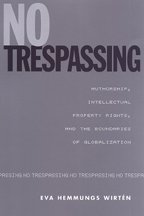

Most ebook files are in PDF format, so you can easily read them using various software such as Foxit Reader or directly on the Google Chrome browser.
Some ebook files are released by publishers in other formats such as .awz, .mobi, .epub, .fb2, etc. You may need to install specific software to read these formats on mobile/PC, such as Calibre.
Please read the tutorial at this link: https://ebookbell.com/faq
We offer FREE conversion to the popular formats you request; however, this may take some time. Therefore, right after payment, please email us, and we will try to provide the service as quickly as possible.
For some exceptional file formats or broken links (if any), please refrain from opening any disputes. Instead, email us first, and we will try to assist within a maximum of 6 hours.
EbookBell Team

4.3
58 reviewsIn this scholarly yet highly accessible work, Eva Hemmungs Wirtén traces three main themes within the scope of cultural ownership: authorship as one of the basic features of print culture, the use of intellectual property rights as a privileged instrument of control, and finally globalization as a pre-condition under which both operate. Underwritten by rapid technological change and increased global interdependence, intellectual property rights are designed to protect a production that is no longer industrial, but informational.
No Trespassing tells the story of a century of profound change in cultural ownership. It begins with late nineteenth-century Europe, exploring cultural ownership in a number of settings across both spatial and temporal divides, and concludes in today's global, knowledge-based society. Wirtén takes an interdisciplinary and international approach, using a wide array of material from court cases to novels for her purposes. From Victor Hugo and the 1886 Berne Convention, to the translation of Peter Høeg?s bestseller Smilla's Sense of Snow, Wirtén charts a history of Intellectual property rights and regulations. She addresses the relationship between author and translator, looks at the challenges to intellectual property by the arrival of the photocopier, takes into account the media conglomerate?s search for content as a key asset since the 1960s, and considers how a Western legal framework interacts with attempts to protect traditional knowledge and folklore. No Trespassing is essential reading for all who care about culture and the future regulatory structures of access to it.